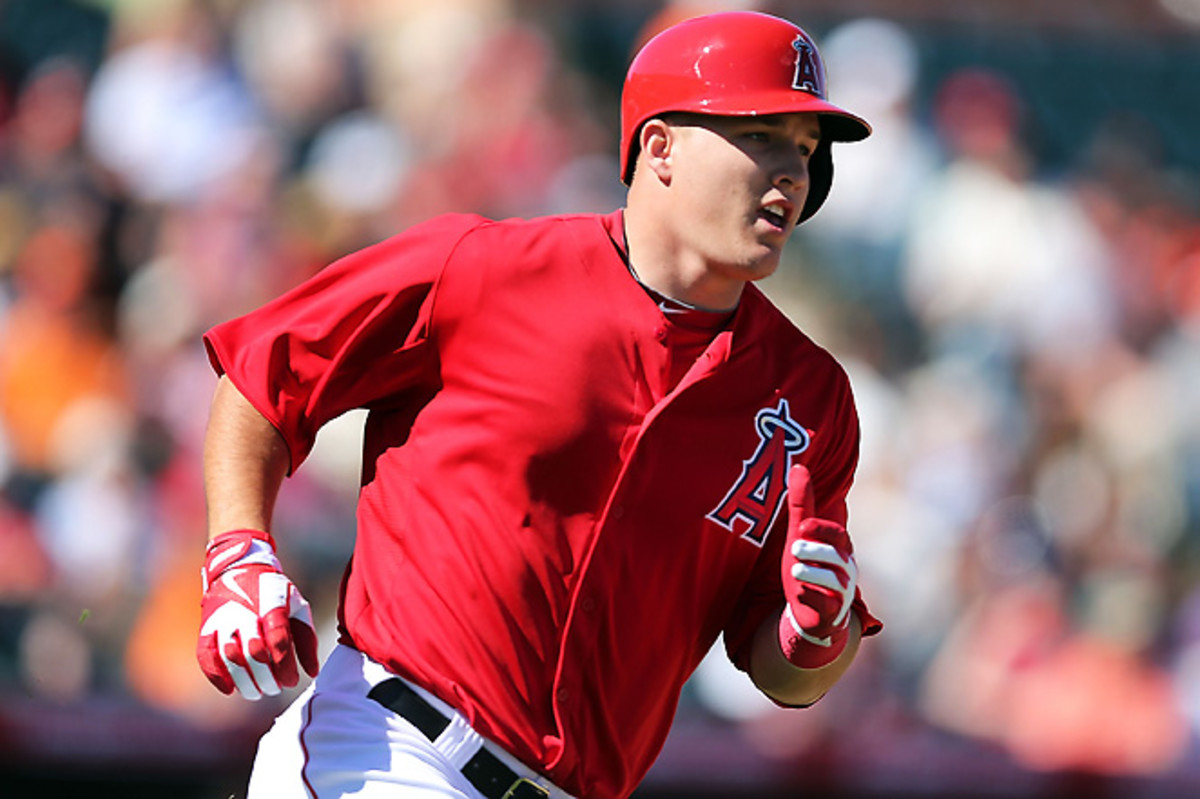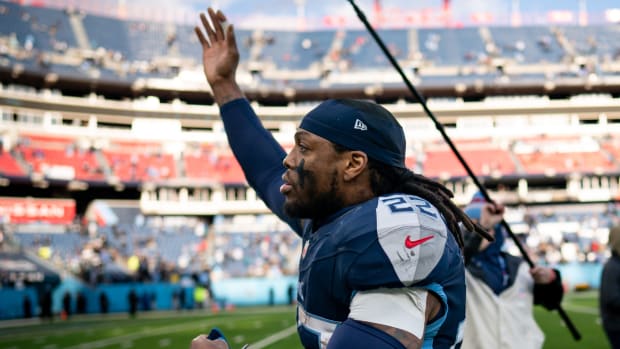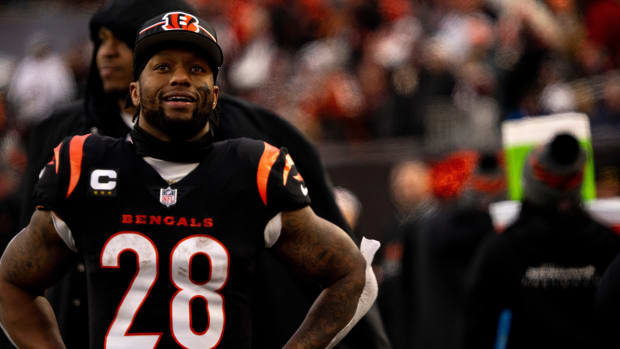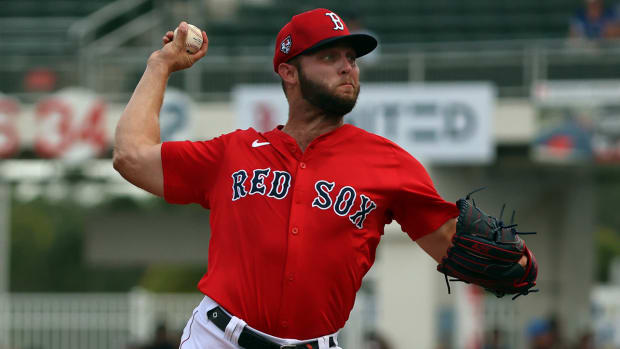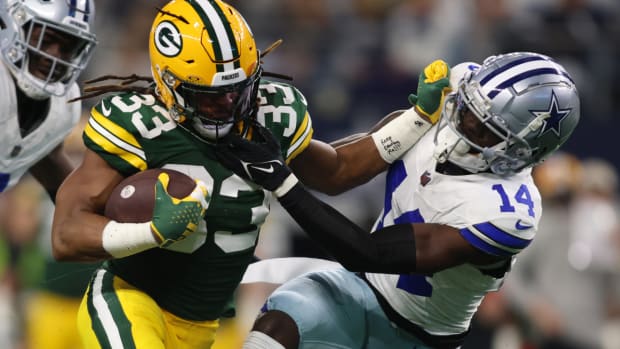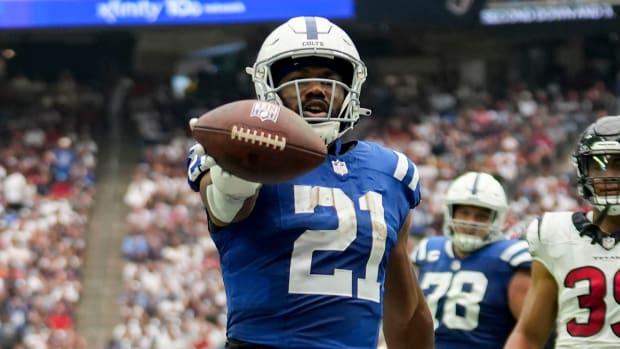Fantasy baseball 2013 preview: SI staff Mock Draft

Outfielder Mike Trout will likely be the first player selected in most fantasy baseball drafts this spring.
Christian Petersen/Getty Images
Fantasy baseball 2013 draft prep central: Rankings, position primers and much more
With the 2013 MLB season fast approaching, 12 of Sports Illustrated's baseball and fantasy experts decided to get together for some fantasy fun. Here's an in-depth look at how the draft went, including round-by-round and team-by-team breakdowns, self-assessments from each team owner, key observations and more. Be sure to examine the rest of SI.com's draft kit, including our Top 300 rankings, printable Cheat Sheet and much more.
The format
This draft is for a 12-team standard 5x5 rotisserie league. Each team starts two catchers, one first baseman, one second baseman, one shortstop, one third baseman, one corner infielder, one middle infielder, one utility man, five outfielders and nine pitchers.
The draft order
1. Bette Marston, SI.com associate producer 2. Stephen Cannella, SI assistant managing editor 3. Joe Lemire, SI staff writer 4. Paul Forrester, SI.com producer 5. Albert Chen, SI staff writer 6. Ben Reiter, SI staff writer 7. Ted Keith, SI.com producer 8. Michael Beller, SI.com fantasy contributor 9. Jay Jaffe, SI.com MLB blogger 10. Mallory Rubin, SI.com senior editor 11. Eric Mack, SI.com fantasy contributor 12. Cliff Corcoran, SI.com MLB blogger
Some observations
? The first closer went off the board way too soon: Craig Kimbrel may be the best fantasy reliever by a mile, but drafted at No. 23 overall, he went off the board before such starters as Matt Cain, Felix Hernandez and Cole Hamels and such bats as Jose Reyes, Bryce Harper and David Wright. Regardless of the format, the first closer tends to go around pick No. 50, though that average can drop even later in rotisserie formats. Kimbrel will post a low ERA and deliver plenty of saves, but saves simply don't carry enough weight against the nine other categories to justify this draft position. The next closer taken? Jonathan Papelbon in Round 9.
? The first catcher went too early as well: Buster Posey is coming off an MVP season, and he's clearly the best option at his position. He's got dual eligibility working in his favor as well. But Posey's inflated value in this draft and many others stems largely from an outdated perception of the catcher position, which is no longer the thinnest in fantasy and is in fact quite deep. How deep? Well, Brian McCann went in Round 16. Catchers always pose a heavy injury risk, making them unwise first-round picks, and they rarely live up to their draft position when its elevated to this extreme -- just ask Joe Mauer. Even if Posey has another incredible season, he's unlikely to finish as a top-seven fantasy performer.
? The first rookie went in Round 10: Tampa Bay super-phenom Will Myers has dominated the headlines this spring, but San Diego infielder Jedd Gyorko was the first rookie off the board in our draft. Gyorko likely won't go that early in most drafts, but his power potential at the thin second base position could make him a fantasy starter sooner rather than later. Myers was the next rookie off the board, in Round 17, followed by Arizona's Adam Eaton in Round 18, Detroit's Bruce Rondon and Cleveland's Trevor Bauer in Round 19, Cincinnati's Billy Hamilton in Round 21 and the Cubs' Kyuji Fujikawa with the final pick of the draft. Texas' Jurickson Profar and Baltimore's Dylan Bundy, the top hitting and pitching prospects in baseball, respectively, were not drafted. They'll be hot waiver wire pickups as soon as it sounds like they're heading to the majors.
? Offseason injuries could lead to some serious steals: Curtis Granderson, who likely would have been drafted as a top-10 outfielder before breaking his arm this spring, fell all the way to Round 11. His teammate Mark Teixeira went one round later. Teixeira's the riskier pick given his past injury woes and the recent revelations regarding the exact nature of his injury, but both of these guys could perform like fantasy all-stars once they return to the lineup. Corey Hart, who could miss as few as three weeks of the regular season and will hit atop a loaded Brewers lineup once he returns, fell all the way to Round 21.
? It's crowded at the top, but very lonely at the bottom: Eight MLB teams earned Fantasy Juggernaut status by seeing 12 players drafted: the Angels, Braves, Brewers, Cardinals, Giants, Nationals, Reds and Red Sox. While the Marlins saw just three players drafted following their latest fire sale, they weren't the low men on the fantasy totem pole. That dishonor went to the Houston Astros, who saw just two players drafted: Jose Altuve in Round 5 and Jose Veras in Round 23.
Round-by-round breakdown
Team-by-team breakdown
Marston: I grabbed Carlos Santana in the third round, thinking he'd fill my catcher slot. When he filled the first base slot in our CBSSports.com draft, I panicked and grabbed Napoli at the fifth round for a catcher. Napoli. In the fifth round. Definitely don't think he's worth a fifth round pick since he's getting old, but at the time, my thought was, "Get a catcher, quick!" In retrospect, it should have been the other way around -- I should have grabbed another first baseman after snapping up Zimmerman in the fourth round. Sure, Napoli, and even Todd Frazier, who I grabbed in the 14th round, can play first base, but I'd rather not have to depend on three sometimes-play first basemen. Other than that, I'm relatively pleased with my draft. I did not prioritize pitchers, so I'm happy I got Balfour in the 16th -- I feel like many people in our draft were left scrambling for relievers. My one regret? Not picking any Tampa Bay Rays.
Cannella: I had the second pick, and even I couldn't screw it up: With Mike Trout off the board I went straight for Miguel Cabrera. Defense and WAR be damned -- in the fantasy world, Triple Crown numbers (and the AL's second-best run total in 2012) still mean something. Things got a little tougher after that. While I landed a few solid sure-thing picks -- Cabrera, Jose Reyes, Craig Kimbrel and Madison Bumgarner (I think) should be money in the bank -- I'm relying on a lot of guys to either repeat career years or at least not regress all the way to their pre-2012 selves. Can Josh Reddick hit 30 bombs again? Can Brandon Morrow stay healthy? Can Alex Rios be productive in an odd-numbered year? (He hasn't done it since 2007.) Will the American League figure out Wei-Yin Chen in his second season? Can Alex Cobb take a leap in his second? I think I'll hit on a few of those gambles, but an outfield lacking in star power and a pitching staff deep in No. 3 starters could be my undoing. But if anyone wants to trade for a power hitter, I'm all ears.
Lemire: I thought there was a clear top-three to start the draft, and I would have been happy with whichever of the three was left, so Ryan Braun is a great cornerstone. I might have reached with Ian Kinsler at the back of the second round, but there seem to be fewer elite hitters at that position than there used to be. I'm obviously banking heavily on Felix Hernandez's elbow holding up and Lance Lynn, A.J. Burnett and Kris Medlen not regressing too much, though even a full run worse ERA for Medlen is a still-stellar 2.57. My offense is more well-rounded and more consistent than my pitching staff, but I was pleased with the overall roster.
Forrester: This team should have plenty of hitting (it better, since I didn't take a pitcher until Round 7). As "poor" as his season was last year, Albert Pujols is still a given for .300, 30 homers and 100 RBI at a minimum. Paul Goldschmidt and Will Middlebrooks should boost the power numbers, and the reward is worth the risk that Yadier Molina repeats his monster 2012 and Melky Cabrera proves he can mash while off PEDs. Speed and scoring is sprinkled throughout the lineup, from Starlin Castro at shortstop to a collection of outfielders who don't carry long track records, but should produce in sum what they lack as individuals. The same philosophy guided my pitching selections. There are too many variables with hurlers to bank them early. That means targeting talents slightly past their primes (Roy Halladay, Jake Peavy) and some health risks (Adam Wainwright, Tommy Hanson). If the bulk of the staff proves serviceable, the waiver wire may cover the rest, but it won't be pretty some weeks.
Chen: What I like: I passed on the elite starters because I think Gio, Moore, Johnson and Brett Anderson all have the ability to reach that level this year -- I love my starting pitching depth. Aroldis Chapman in Round 8 is my favorite pick: He could be David Price in the rotation, or, worst case, the Reds move him back to the bullpen and he's back to being an elite closer with 40 saves and a ton of Ks. Shelby Miller is my big sleeper: I think he's in for a big season, even if he doesn't start the year in the rotation. My plan was to build around a stud infield, and I got halfway there with Cano and Longoria. I just couldn't pass up 2013 NL MVP Bryce Harper and also Ellsbury and Holliday where I got them. I like my outfield a lot. I'm not doing back flips that Paul Konerko is my first baseman, but what's so bad about a .290 average, 25-30 home runs and close to 100 RBI? I have Teixeira stashed away, so I'm pleased with how first base turned out -- that position is shockingly shallow this year. What don't I like? Well, I waited on closers, and Janssen, Street and Veras could do some big-time damage to my ERA and WHIP. Reiter took Hanley the pick before me, so instead I was left with JJ Hardy and Everth Cabrera -- I will be dealing some starting pitching for a shortstop. I also am not happy with my catching situation: I actually think Montero is underrated, but his K rate scares me and I'm not sure there's much upside there. And John Jaso as my second catcher isn't going to cut it. Josh Johnson for Wilin Rosario, Beller?
Reiter: I know. Dustin Ackley in the 10th round. Maybe I like players who share last names with minor characters in Catcher in the Rye. Maybe I panicked after watching nine players fly off the board at a weak position. Maybe I wouldn't do it again. Can I live? No regrets, other than that. I have Matt Kemp ranked fourth overall, after Trout-Cabrera-Braun (in that order), so I was pleased to grab him at six. Then I tried to mix in high-upside personal favorites (Yoenis Cespedes in the third, Sal Perez in the eighth, Jean Segura in the 17th, Andrew Cashner in the 20th) with established stars who I felt represented value picks (a shortstop-eligible Hanley Ramirez in the fourth, CC Sabathia in the seventh, Jon Lester in the 16th). The result, I think, is a generally well-rounded club that is particularly deep in starting pitching. Lester and Sabathia, after all, have in recent years been fantasy aces, but I'm only counting on them to be my No. 3 and No. 4, after Yu Darvish and Zack Greinke. I see no reason why this team won't compete. Provided that Ackley hits, oh, .250.
Keith: Nobody wants the seventh pick. Too far from getting the safe choices up top, too far from getting the snake pick at the bottom. That said, it was hard to pass up the chance at drafting Buster Posey, the reigning National League MVP and undisputed best catcher in baseball. I was more pleased with my second-round pick, AL Cy Young winner David Price, and just to make sure my team had more bling than anyone else's, I later added R.A. Dickey, last year's NL Cy Young winner, as well. My best choice may have been adding the criminally undervalued Ben Zobrist in Round 4, but for the most part, my selections alternated between finding veterans who I think can still provide lots of value (David Wright, Derek Jeter, Chase Utley, Joe Nathan) and young players with breakout potential (Eric Hosmer, Homer Bailey, Lorenzo Cain, Ross Detwiler). Not bad for the seventh slot after all.
Beller: I'm very happy with my team's power. With Votto, Bautista, Adam Jones, Granderson, Rosario, Kipnis, Howard and Lawrie, I should be one of the strongest teams in the offensive counting categories. Considering those are the categories that drive hitting success, I feel great about that. I also like my rotation. Kershaw gives me an ace, and Samardizija and Gallardo provide consistency and strikeouts in the middle of the rotation. If two out of Estrada, Bauer and Worley hit, I'm looking good.The one place I could see this team struggling is in batting average. Votto and Jones are my only BA stalwarts. I'm also not in love with my shortstop options (Josh Rutledge and Marco Scutaro). I could for sure see dealing some power to pick up a better shortstop at some point during the season.
Jaffe: It's been three years since I last drafted a fantasy team, and I certainly felt rusty even if it didn't show. Since I've always preferred 5x5 to 4x4, my ingrained preferences for strikeout-oriented pitchers and high-OBP hitters who wind up scoring runs should have been reflected in my choices, and I think for the most part it was. Headed by Stephen Strasburg and Chris Sale, all of my starting pitchers whiffed at least 7.0 per nine last year; it's their durability, and that of Chad Billingsley, that's in question. My closers, Glen Perkins and Chris Perez, speak to the fact that I treated saves as an afterthought but looked for guys who would at least miss bats while piling up saves for mediocre-to-bad teams. The offense has plenty of power, starting with Giancarlo Stanton, though the ability of guys like Chase Headley, Adam LaRoche and Aaron HIll to repeat those 30-plus homer seasons is in question. While I drafted no burners, my roster has an abundance of hitters to provide steals in addition to everything else: Headley, Hill, Ian Desmond, Brandon Phillips, Carlos Beltran, Dexter Fowler and Austin Jackson all stole between 12-21 bases last year. I tried to avoid OBP sinks; I believe Russell Martin is my only player who was below .320 last year, and he's got good enough power and speed for the position to offset that. If I actually had to play the season out, I think it this team -- El Maximo Jaffe -- would be a fun one to run.
Rubin: We drafted a week ago, and I still can't believe I got Andrew McCutchen at No. 10; we've got him at No. 5 in our SI.com Top 300. Troy Tulowitzki is always an injury risk, but if he stays healthy, I'll have stolen a guy who in recent years routinely went in the top five overall. Streaky or not, I think Jay Bruce can give me 40 homers, and I'm incredibly excited about Freddie Freeman and Mark Trumbo, two guys poised to far outplay their draft position. Dan Uggla will be a terrifying drain on my team batting average, but he'll further cement my lineup's status as one of the most homer-happy in the league. I've got pop at every position, but still have decent speed with Carlos Gomez, McCutchen and Danny Espinosa. Despite waiting on closers, I landed three guys who should post solid saves totals and will surely deliver robust strikeout numbers. The Wade Miley pick was a bad one given his current injury concerns, and especially bad considering Jeremy Hellickson was still on the board, but the rest of my starters play for winning clubs, which should mean ample victories in addition to lots of Ks and low ERAs. Playoffs, here I come.
Mack: This wasn't my best execution of a draft, but it was just the fourth one of the season. It is a case-study in why you want to do a number of mock drafts before your big event of the spring, be it a big-money league or merely the only fantasy league you are in. You get better and more efficient with your picks every draft you do. I loved getting Jeremy Hellickson in Round 19. That was a pure steal, some 12 rounds after Matt Moore. I loaded up on the counting numbers (HR, RBI, R, SB) early in the outfield, corner infield and at catcher, scored three 40-save caliber closers and still wound up with a potentially great starting rotation. It meant punting middle infield, which I have done in all four of my drafts thus far, but at least Howard Kendrick, Stephen Drew and Gordon Beckham have some upside. I just can't get away from drafting those erstwhile prospects, apparently. This is a well-rounded, multi-category team with enough talent to compete for a title.
Corcoran: We drafted this league on Monday, March 11, and I drafted my regular league on Friday, March 15. This league is 5x5 roto with high position-eligibility requirements. My regular league is a points league with low position eligibility-requirements. Using my draft lists for the latter led me slightly astray at times in this draft, particularly when I took Martin Prado in the sixth round thinking he qualified at second base (he doesn't in this league). However, as the draft went on, I realized just how shallow the pool of outfielders was and the Prado pick didn't look quite as bad, and while pitching is far more important in my points league than in this league, I remain satisfied with my pick of Verlander in the first round, as well. Overall I'm content with the team I wound up with. I typically favor power hitters who fill HR, RBI, and often R categories over high-average speedsters who help with AVG and fill SB and R (another product of my points league, which awards points for walks and doubles and takes away points for times caught stealing), but this team leans more toward the latter because of the different format and the fact that those players seemed to be in greater supply in the middle and late rounds. I managed to avoid starting pitchers on bad teams who would struggle to compile wins in accordance with the quality of their pitching, and picked up three closers with Fujikawa, Mr. Irrelevant in this draft, a pitcher I expect to take over that role at some point during the season. It's not a great team, but it's one with which I'd feel comfortable entering the season.
PRINTABLE DRAFT KIT: Top 300 Cheat Sheet | Position Rankings Cheat Sheet
































